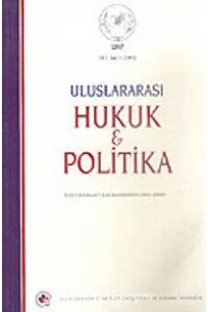Uluslararası İlişkilerde Meşrutiyet ve Birleşmiş Milletler Güvenlik Konseyi'nin Meşrutiyet Krizi
Özet: İkinci Dünya Savaşı sonrası kurulan Birleşmiş Milletler (BM), kurulduğu andan bugüne değin hiç olmadığı kadar derin bir kriz ile yüz yüze kalmış du-rumdadır. BM'nin varlık ve etkinlik sorununu oldukça etkileyen bu kriz; meşruiyet krizidir. BM'nin bu krizden hasıl çıkacağı, hayata geçireceği reformlara ve kaybettiği siyasi kararlılığı yeniden kazanıp kazanamayacağına bağlıdır. Öncelikle üyelerin reform çalışmaları konusunda samimi olmaları ve Genel Ku- rul'daki görece demokratik ortamın başta Güvenlik Konseyi olmak üzere BM'nin diğer tüm organ ve kuruluşları için de sağlanması gerekiyor. Örgütün kurulduğu ilk yıllardan beri gelen reform ihtiyacı karşılanamadığı, Konsey'deki veto ve temsil adaletsizliği giderilemediği sürece BM'nin meşruiyeti büyük yara almaya devam edecektir. Anakronik yapı, orantısız temsil sorunu, veto yetkisinin sınırlı sayıda üyeye verilmiş olması, fin ansal sorunlar, siyasi kararlılık eksikliği, kolektif güvenlik mekanizmasının işlevsiz hale gelmesi, bölgesel entegrasyon ve yapılanmaların giderek daha etkili olması, uluslararası toplumun BM'ye olan güveninin sarsılması vb. gibi bir dizi sorun içinde BM meşruiyet krizini en azından öngörülebilir bir gelecekte aşabilecek gibi görünmüyor. Ayrıca, kriz aşılmadığı sürece BM Antlaşması ile tesis edilmiş ve büyük ölçüde kabul görmüş normlar bütünü de özünden sarsılabilir. Bu bağlamda, meşruiyet sorunu sadece bir etkinlik değil aynı zamanda bir varlık sorunu olarak da değerlendirilmelidir.
Legitimacy in International Relations and the Legitimacy Crisis of United Nations Security Council
Abstract: The United Nations (UN), having founded following the World War II, is face to face with a deep crisis that never experienced before. This is the legitimacy crisis heavily affecting the raison d'etat and the UN's question of efficiency. The way how the UN will break through this crisis is conditional upon its reforms and will to regain its political determination. Before all else, the member states have to be sincere about the reform endeavors and there is a certain need to settle the relatively democratic medium of the General Assembly in all bodies of the UN. The legitimacy crisis of the UN will continue to bleed unless the needs for the reforms since the early years is fulfilled and the injustice of veto and representation in the Security Council are removed. Yet, the UN does not seem to overcome the legitimacy crisis in the foreseeable future due to problems such as anachronic structure, disproportionate representation, very limited veto authority, financial difficulties, lack of political determination, malfunctionality of collective security, the rising effectiveness of regional integrations and such organizations and convulsion of international trust towards the UN. Moreover, as much as this crisis continues the norms founded with the UN Charter and adopted on a large scale could wither away substantially. In this context, legitimacy crisis should be evaluated not as a matter of strength but also a question of existence.
___
- boş
- ISSN: 1305-5208
- Yayın Aralığı: Yılda 5 Sayı
- Başlangıç: 2018
- Yayıncı: Uluslararası Stratejik Araştırmalar Kurumu
Sayıdaki Diğer Makaleler
Avrupa Birliği Anayasası ve Reform Antlaşması
İsrail Dış Politikasının Tarihsel ve Toplumsal Temelleri Üzerine Bir İnceleme
Sovyetler Birliği İçin İktidarın Anaysası Üzerine
Ortaklık Mevzuatına İstinaden Açılabilecek Davalar
NATO'nun Kosova'ya Müdahalesinin Uluslararası Hukuk Açısından Geçerliliği
Uluslararası İlişkilerde Meşrutiyet ve Birleşmiş Milletler Güvenlik Konseyi'nin Meşrutiyet Krizi
NATO'nun Kosova'ya Müdahalesinin Uluslararası Hukuk Açısından Geçerliliği
